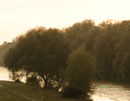Final Frontiers: Exploring Oceans, Islands, and Coastal Environments
Conference
20.10.2011 – 23.10.2011
Location: Island Institute, Rockland, Maine, USA
Conveners: John Gillis (Rutgers University), Franziska Torma (RCC)
Conference Report (pdf, 141 KB)
Call for Papers – English (pdf, 148 KB)
Despite the enormous advances that have taken place in environmental history, the field still remains, to a great extent, stubbornly landlocked. The enduring notion of the eternal sea has exempted oceans from historical examination, assigning them to maritime history which has been concerned primarily with what takes place on, rather than in the sea itself. In a similar manner, the idea that the sea is a “placeless place” has put it off-limits to geographers. In the same way, lands most closely associated with water such as islands and coasts have remained unmarked, unexplored categories. Environments where earth and water meet and mix, notably wetlands, are only just beginning to be explored. “Always the edge of the sea remains an elusive and indefinable boundary,” wrote Rachel Carson. Regrettably, this remains the case today.
Because oceans are perceived as belonging to nature rather than to culture, they would seem to be in the domain of the sciences rather than the humanities. But this too must be questioned now that we are beginning to understand the ways in which oceans themselves are cultural constructs and how much they signify. The epistemological frontiers of environmental history are among the things we wish to explore in this interdisciplinary conference through both theoretical reflection and empirical study.
This conference will consider the ways in which the inclusion of oceans, coasts, and islands would alter the practices and paradigms of environmental history. It will bring together junior and senior scholars, including W. Jeffrey Bolster, Michael Pearson, Paul D’Arcy, Helen M. Rozwadowski, and Philip E. Steinberg, in an effort to chart the future of the field. In an attempt to close what constitutes a “blue hole” in environmental history, we invite papers from junior scholars of all world regions. Contributions from the sciences and social sciences are welcome as long as they are concerned with change over time in the interaction of humans and the natural world.
This event will consist of a series of workshops designed to lead to a set of essays that may be collected in a book exploring the possibilities and consequences of bringing oceans, islands, and coasts into focus. Proposals for papers should indicate how their content might contribute to such a rethinking of the field in one of the six areas indicated below. They should deal with the time period between 1700 to the present, but can focus on any world region. The papers will be precirculated so as to ensure maximum discussion and collaboration.
Workshop topics will include:
- Beyond the Atlantic World: Perspectives from Other Oceans
- Reimagining Oceans: Marine Arts and Literatures
- Historicizing Seas and Marine Life
- Oceanic Epistemologies: Science and Local Knowledges
- Waterlands: Islands, Coasts, and Estuaries
- Finding a Place for Oceans: Geographies of Seas, Shores, and Islands
For further questions, please contact either of the event conveners:
John R. Gillis ![]() E-Mail or Franziska Torma
E-Mail or Franziska Torma ![]() E-Mail
E-Mail


